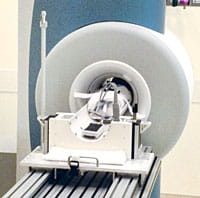Magnetic Resonance Imaging
We Have the Only Infant-Sized Scanner Housed in a NICU
 An innovative, high-field magnetic resonance (MR) scanner designed by researchers at Cincinnati Children’s Hospital Medical Center could provide a safer way of performing imaging studies on critically ill and premature newborns. Currently in operation for investigational use in the Neonatal Intensive Care Unit (NICU), it is the only infant-sized MR scanner in the world housed within a NICU and the only one in the world designed specifically for infants.
An innovative, high-field magnetic resonance (MR) scanner designed by researchers at Cincinnati Children’s Hospital Medical Center could provide a safer way of performing imaging studies on critically ill and premature newborns. Currently in operation for investigational use in the Neonatal Intensive Care Unit (NICU), it is the only infant-sized MR scanner in the world housed within a NICU and the only one in the world designed specifically for infants.
Benefits for Fragile Newborns
A team of Cincinnati Children’s researchers led by Charles Dumoulin, PhD, designed the scanner, which is expected to provide minimal disruption to care, reduced risk of infection and injury and less stress for patients and families.
MR scans are vital to neonatologists who need precise data that might change a newborn’s course of care, such as the severity of brain damage after a traumatic birth. Because they do not use radiation, MR scans also present less of a health risk than other imaging technologies, especially in preterm infants whose systems are still developing.
However, performing an MR study on critically ill and premature infants presents logistical complexities because it typically involves transporting these patients to an imaging area elsewhere in the hospital. As a result, MR scanning for NICU patients is infrequent and often non-existent.
Having an infant-sized scanner in the NICU brings the full capabilities of MR imaging to patients who are too fragile to be transported safely outside the NICU. Infants can be transferred to the MR unit in their own isolette and easily moved to the imaging table.
Research Potential
The MR scanner has the potential to help Cincinnati Children’s neonatologists and other pediatric subspecialists learn more about rare and complex pediatric conditions such as:
- Brain injuries from traumatic births
- Congenital diaphragmatic hernia and other congenital heart diseases
- Necrotizing enterocolitis and other gastrointestinal diseases
- Airway and esophageal disorders
- Rare lung disease
- Colorectal malformations
- Urogenital disorders
Current Areas of Research
Researchers at Cincinnati Children’s are developing a neonatal transfer cradle that will allow for heat and humidity control during MR scans. With the new approach, patients would stay in their own isolette during the study and full monitoring capabilities would continue in the MRI suite.
Researchers also are developing protocols to evaluate the efficacy of MR scans to study the brain and abdomen in patients with acute necrotizing enterocolitis and to identify imaging markers of pulmonary hypertension in patients with congenital diaphragmatic hernia.




